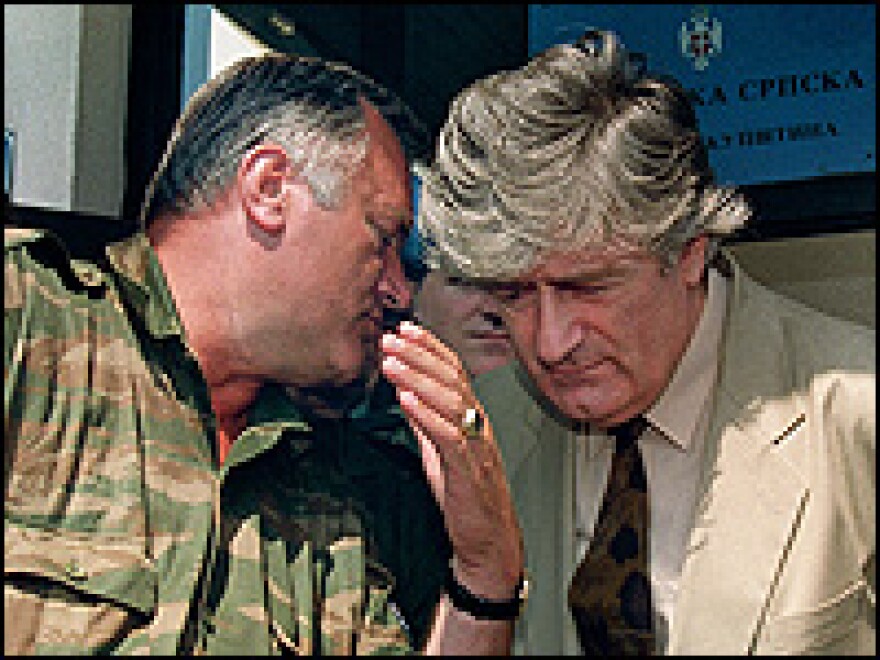

After living more than a dozen years as a fugitive, Radovan Karadzic has been turned over to the international war-crimes tribunal in The Hague. About 15,000 Serbian ultra-nationalists demonstrated in Belgrade on the eve of the former Bosnian-Serb leader's extradition to the Netherlands. Many nationalists still regard Karadzic as a hero and a defender of ethnic Serbs in Bosnia.
It's expected that the legal process will reveal more about Karadzic's alleged role in atrocities committed during the Bosnian War, as well as his years underground.
The man arrested by Serbian security forces on July 21 looked startlingly different from the portly, shocked-haired politician who led nationalist Serbs in Bosnia during the early 1990s. Police say Karadzic, wearing a full white beard and long white hair, used a false name to work openly in Belgrade as a healer and expert in alternative medicine.
The Charges
Karadzic was wanted for crimes allegedly committed during the Bosnian War from 1992 through 1995, after the disintegration of Yugoslavia. As president of the Serb Republic established in Bosnia-Herzegovina, Karadzic was accused of ordering the so-called "ethnic cleansing" of Bosnian Muslims.
The army of the Bosnian Serb Republic, under the command of Gen. Ratko Mladic, was accused of using terror, murder and rape to drive Muslims and ethnic Croats from their homes.
In 1996, Karadzic was indicted by the International Criminal Tribunal on two counts of genocide and five counts of crimes against humanity, as well as other crimes. More than 100,000 people, civilian and military, are believed to have been killed during the war. The Institute for War and Peace estimates that about 65 percent of the civilians killed were Bosnian Muslims.
The Srebrenica Massacre
The most notorious mass murder committed during the war was the Srebrenica massacre of 1995, in which Bosnia Serb forces and Serbian paramilitaries systematically slaughtered about 8,000 Muslim men and boys. The massacre has been ruled an act of genocide by both the International Criminal Court for the former Yugoslavia and the International Court of Justice.
Despite a warrant for his arrest and a price on his head, Karadzic managed to evade capture for nearly a dozen years.
At various times, he was reported to be living in Russia, Serbia or parts of Bosnia-Herzegovina that were controlled by Serbs.
Karadzic's Beginnings
Karadzic, now 63, was born and reared in Montenegro. His father was a member of the Yugoslav monarchist paramilitary group known as the Chetniks and was in prison during much of his son's childhood.
Radovan Karadzic got a medical degree and moved to Sarajevo, the capital of Bosnia-Herzegovina, to pursue his studies in psychiatry. He later spent a year studying medicine at Columbia University in New York. He also became a published poet, and came under the influence of Serbian nationalist writers.
In 1989, he became one of the founders of the Serbian Democratic Party, which sought to get ethnic Serbs in Bosnia-Herzegovina and Croatia to support the idea of a "Greater Serbia" that would extend over all the lands inhabited by Serbs.
In 1991, he was instrumental in forming a separate Bosnian Serb Assembly, which later declared the Serbian Republic of Bosnia-Herzegovina and made him its president.
The war crimes tribunal in The Hague has tried dozens of suspects, including Karadzic's one-time ally, the former Serbian President Slobodan Milosevic, who died in 2006 before his trial could be completed. The court is still seeking the arrest of the former Bosnian Serb general, Ratko Mladic.
Copyright 2023 NPR. To see more, visit https://www.npr.org. 9(MDM3NjYwMjA5MDE1MjA1MzQ1NDk1N2ZmZQ004))

